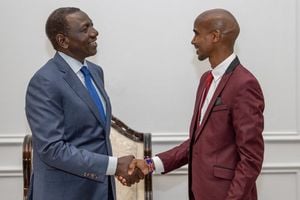Clerical errors to blame for tainted voters register
What you need to know:
- This figure is significant particularly in a closely-fought election as it opens the possibility of ballot stuffing.
- The audit found that there were 435,157 people who had been confirmed dead but whose names remained in the register.
As many as a million dead voters could be in the election register, according to a report released by the auditing firm, KPMG.
This figure is significant particularly in a closely-fought election as it opens the possibility of ballot stuffing, which was cited as one of the irregularities that marred the disputed results of the 2007 presidential election.
The dispute sparked violence that claimed 1,133 lives.
ELECTORAL FRAUD
The question of dead voters “rising on voting day to cast their ballots” has in the past sparked controversy, with politicians saying this opened an avenue for vote fraud.
According to the audit, whose findings were presented to the electoral commission today, there could be as many as 1,037,260 voters in the register who could have died between November 2012 and December last year.
By comparing data from the principal registrar of births and deaths, the audit found that there were 435,157 people who had been confirmed dead but whose names remained in the register.
CLEAN REGISTER
Comparing with general population numbers, the audit concluded that 1.5 million people over the age of 18 could have died between 2012 and December last year. However, only 621,832 were registered.
As a start, KPMG asked the Independent Electoral and Boundaries Commission (IEBC) to immediately expunge 92,277 names of deceased persons whose IDs and names matched with those in the register of voters.
“The audit of the register of voters by KPMG is the first independent audit of the register and included comparison of the data in the register of voters against third party data maintained by other State Agencies,” IEBC said.
VOTES CAST
Information from the registrar of persons indicates that there are 25,323,059 Kenyans who have identity cards.
This makes them eligible to vote. However, only 19,646,673 actually registered, according to the register of voters certified by the electoral commission.
In 2013, that number stood at 14.3 million. Out of these, 6,174, 433 voted for Mr Uhuru Kenyatta while another 5,340,546 voted for Mr Raila Odinga.
Mr Uhuru defeated Mr Odinga by 833,887 votes to become Kenya’s fourth President.
He avoided a run-off by only about 8,000 votes.
INCONSISTENT INFORMATION
The scrutiny of the current register found that 2.9 million voters have inaccuracies in their records.
This means that their dates of birth, gender, names and identity card numbers have anomalies.
“The results of the audit suggest that many of these could have been caused by clerical errors,” the report said.
“KPMG have provided complete lists of the voters affected by these inconsistencies and the commission has already commenced the correction of the details.”
Another 5,427 did not have biometric fingerprint images.
DECEASED
Besides the inaccuracies, the audit also revealed weaknesses in the linkages between State agencies, which translates to loopholes capturing information about Kenyans.
“KPMG has also noted that data relating to deceased persons is both incomplete due to low coverage of death registration, and inaccurate as in some cases the full details of deceased persons are not provided, or appear to be inaccurate.
"In addition, there are cases where the ID number indicated as belonging to the deceased person may actually belong to the person who reported the death,” IEBC chairman Wafula Chebukati and CEO Ezra Chiloba said in a joint statement.
UNREPORTED DEATHS
The Civil Registration Department (CRS) has indicated that it has 350,000 details of deceased persons, which will be immediately given to the IEBC.
These should be used to expunge dead voters before the register is certified.
KPMG CEO Josphat Mwaura also raised the possibility that because of cultural, religious and geographical reasons, some deaths go unreported, therefore making it difficult for State agencies to reconcile the data.
SECURE VOTES
The audit was undertaken in line with the Election Laws (Amendment) Act 2016, which require the IEBC to “engage a professional reputable firm to conduct an audit of the register of voters to verify the accuracy of the register, recommend ways of improving the accuracy and also to update the register”.
The scrutiny was part of the agreement reached between the Jubilee Party and the Opposition coalition, Cord, after two weeks of protests that led to the ouster of the IEBC team led by Mr Issack Hassan.
The Opposition had argued that lack of a credible register had been one of the reasons for their loss in 2013.
In recent weeks, the Opposition has been insistent that it will defend its votes by hiring at least five people for every polling station.
REPORT TIMELINE
Speaking during the release of the report, Mr Mwaura — who was accompanied by KPMG partners Gerald Kasimu and Brian DeSouza — said that they had satisfactorily fulfilled the mandate given to them.
“When we set out to do this work, we said to ourselves that we are not doing it for IEBC but to the Constitution. We believe we have done our best,” he said.
The commission now has 14 days to submit the report to the National Assembly and the Senate.





